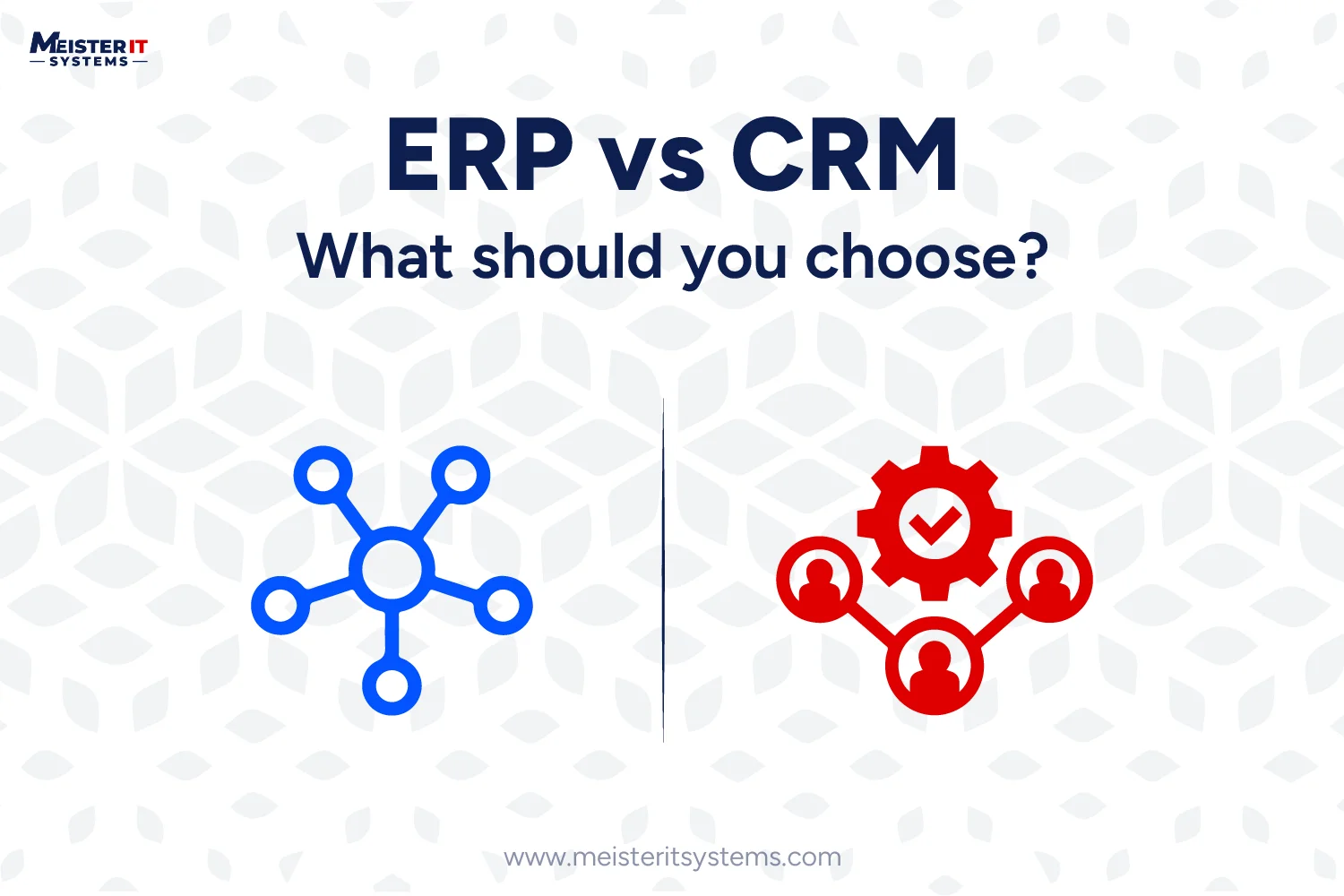Introduction
In today’s fast-paced business environment, organisations need tools that streamline operations and strengthen customer relationships. Deciding between ERP (Enterprise Resource Planning) and CRM (Customer Relationship Management) systems requires a clear understanding of how each can benefit your business. ERP focuses on internal process optimisation, such as finance, inventory, and HR, while CRM is geared toward enhancing sales, marketing, and customer service.
Both systems are powerful and essential, and your choice depends on current business priorities. Not sure which is the best fit? Then, we’ve got you covered. MeisterIT Systems has crafted a comprehensive guide on ERP vs. CRM, outlining key differences, benefits, and why many companies choose to integrate both for improved efficiency and growth.
So, let's get started!
What is ERP?
Enterprise Resource Planning (ERP) serves as the central nervous system of an enterprise, linking all its computer systems. With a custom ERP solution, each department can access and manage its specific data, but all information is centralised in one unified platform.
Did you know that the ERP Software Market is expected to be worth $300 billion by 2027? This business development tool enables enterprises to achieve greater self-awareness by simultaneously linking information on production, finance, distribution, and human resources. This integration enables real-time data sharing and analysis, leading to improved decision-making and operational efficiency.
As a result, ERP solutions can eliminate costly duplication and resolve issues with incompatible systems. The process often integrates accounts payable, stock control systems, order-monitoring systems, and customer databases into a single platform.
Benefits of ERP
ERP software offers several benefits that can significantly enhance efficiency, productivity, and profitability in numerous ways. It combines multiple business functions , delivers real-time data, and streamlining processes more efficiently. If you plan to implement ERP for your business, it is essential to understand how it will benefit you.
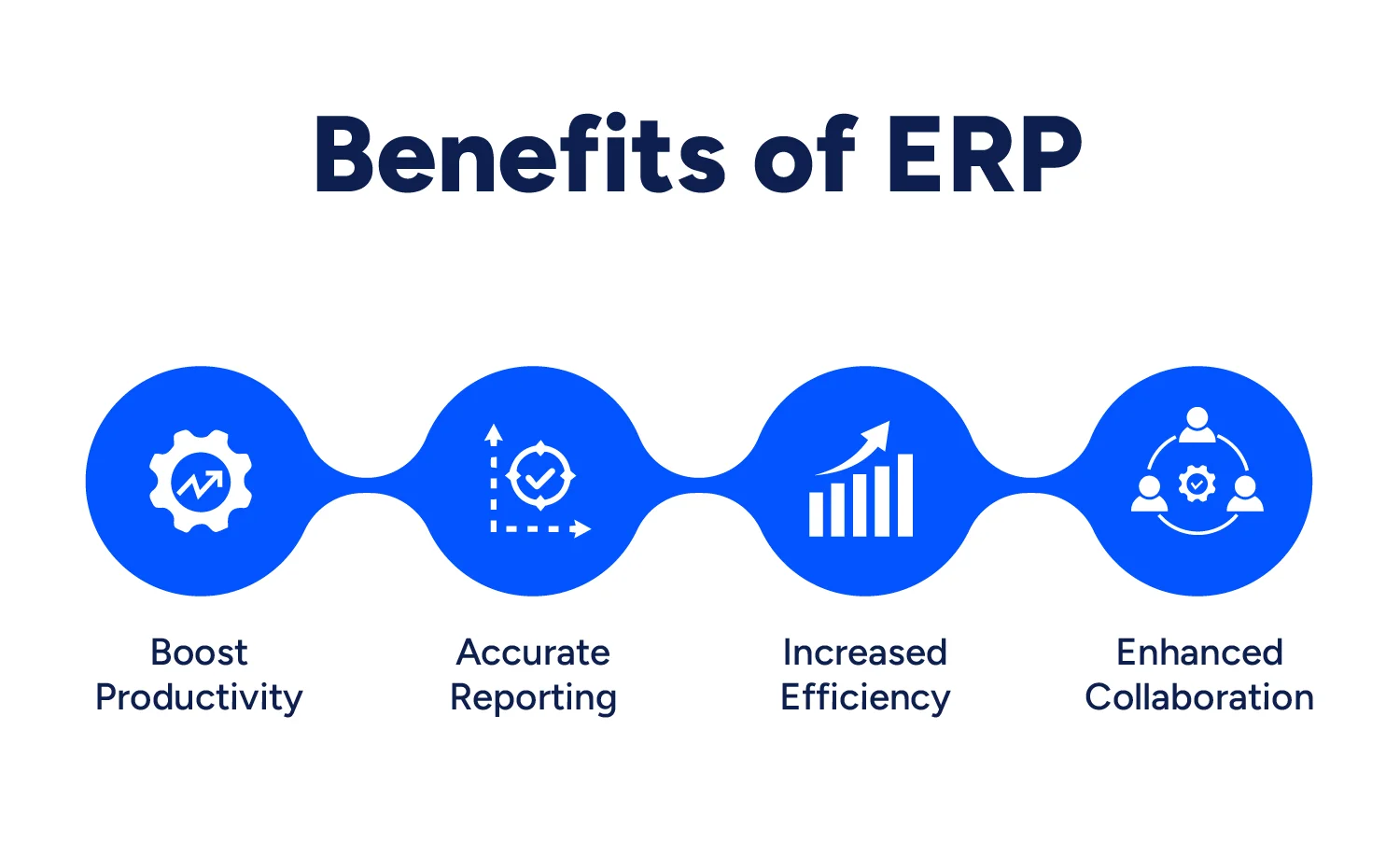
Let’s explore the benefits of an ERP system:
Accuracy and Productivity: It automates your business processes and reduces redundancies while increasing accuracy and productivity. Additionally, ERP aligns departments, ensuring faster, more accurate results.
Reporting: Accurate and comprehensive reporting enables businesses to plan, budget, forecast, and communicate effectively to the organisation and with stakeholders, such as shareholders.
Increased Efficiency: This system allows your businesses to have quick access to information for clients, vendors, and business partners. This leads to higher customer and employee satisfaction, faster response times, and improved accuracy.
Enhanced Collaboration: It fosters collaboration across departments, enabling teams to work together more efficiently and share valuable knowledge. By ensuring that each functional group is aligned with the company's overarching goals and objectives, it boosts both productivity and employee satisfaction.
When to choose ERP?
Consider implementing ERP software when your business is growing and needs to streamline processes across departments. An ERP system integrates core functions such as finance, HR, supply chain, and inventory into one platform, reducing inefficiencies and improving data accuracy. It is an ideal solution for organisations that need centralised control.
95% of businesses have reported process improvements after implementing an ERP system. It helps manage complex operations, expansion to multiple locations, and issues with disconnected software. If you aim to enhance decision-making, reduce operational costs, and ensure compliance with industry standards, ERP can offer a unified solution, driving productivity and supporting scalable growth.
What is CRM?
Customer Relationship Management (CRM) is an all-encompassing approach that businesses adopt to manage and analyse customer interactions throughout their entire lifecycle. It streamlines customer interactions, sales, marketing, and customer service operations. Businesses leveraging CRM software can increase sales by 29%, sales productivity by 34%, and sales forecast accuracy by 42%.
CRM serves as a centralised hub where businesses can store, organise, and access customer data. It enables them to understand their customers better, build stronger relationships, and deliver more personalised services. Whether you’re a small business owner or part of a large enterprise, having your own customised CRM software is essential.
By tracking customer interactions and preferences, businesses can tailor marketing strategies and improve customer satisfaction. By investing in CRM software, companies can stay ahead of competitors and adapt to changing market trends more effectively.
Benefits of CRM
CRM software provides a wide range of benefits that can enhance customer relationships, streamline operations, improve sales, and drive business growth. Whether you are a small business owner or a large enterprise, you can benefit from it in various ways.
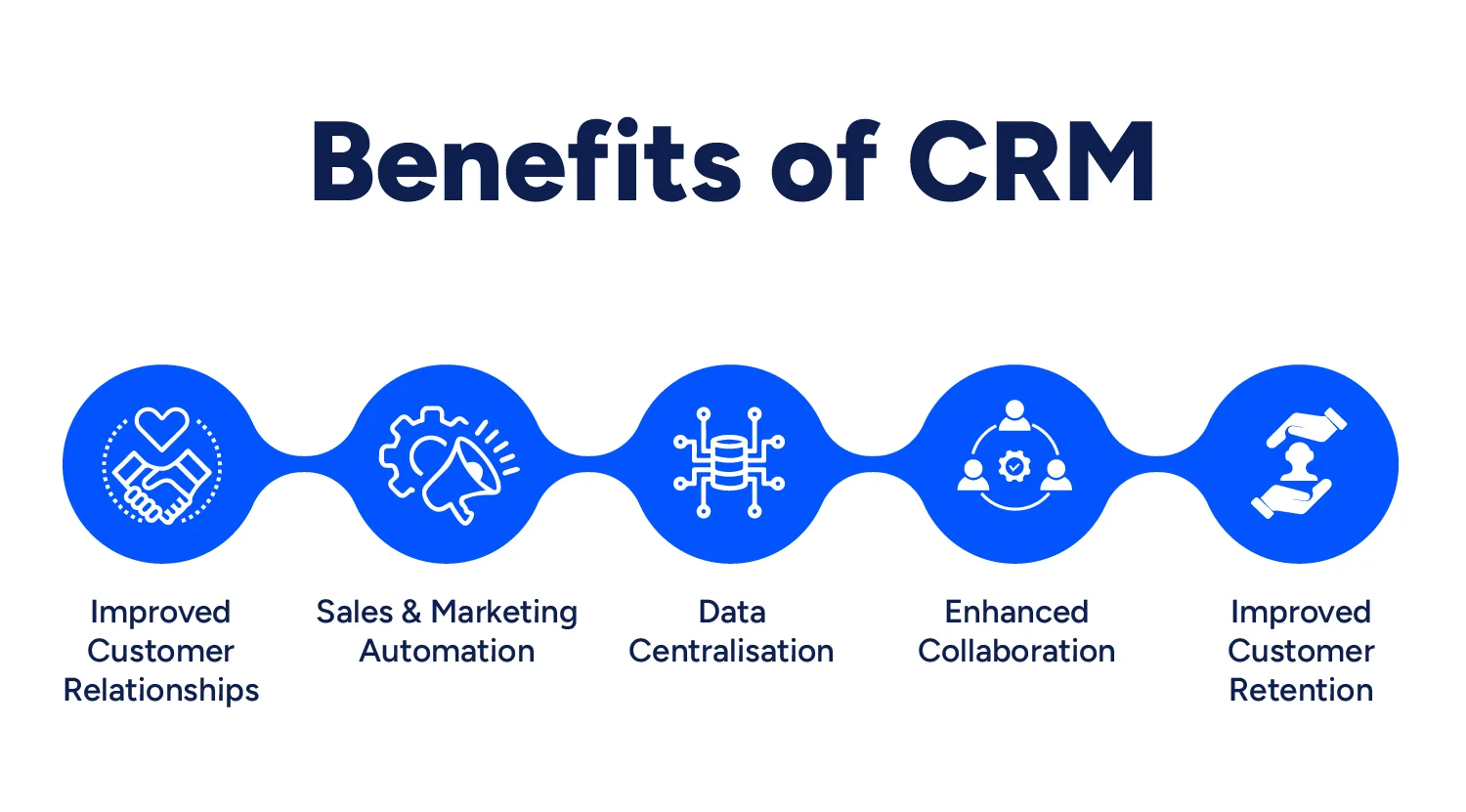
Let’s explore the benefits of a CRM system:
Improved Customer Relationships: It helps manage every customer interaction, enabling personalised communication and enhancing customer satisfaction. By keeping track of customer history and preferences, your teams can offer tailored solutions, leading to stronger relationships and loyalty.
Sales and Marketing Automation: It automates a variety of routine tasks like sales tracking, lead management, and marketing campaigns, saving time and increasing efficiency. It enables your sales and marketing teams to focus more on nurturing leads and closing deals.
Data Centralisation: It unifies customer information from various touchpoints, providing a 360-degree view of each client. It ensures all departments have access to updated data, improving decision-making and enabling more consistent customer interactions.
Enhanced Collaboration: By centralising customer data, this dynamic system collaborates across departments such as sales, marketing, and customer service. This collaboration results in improved communication and quicker response times.
Improved Customer Retention: 47% of businesses state that CRM software has a significant impact on customer retention. It helps track customer interactions, identify potential issues, and enable proactive solutions, resulting in higher retention rates.
When to choose CRM?
A CRM system is essential for businesses looking to efficiently manage customer interactions, track sales, and enhance customer satisfaction. It helps improve relationships, streamline communications, and gain insights into customer behaviour. This is especially beneficial for scaling businesses that prioritise personalised customer experiences.
According to a CRM buyer survey, the top three problems that most companies want to solve through CRM adoption are contact management (50%), sales management (33%), and lead generation (33%). By integrating CRM, businesses can centralise data, enabling teams to work collaboratively and access up-to-date customer information. This ultimately leads to increased efficiency and growth.
Similarities between ERP and CRM
As we discussed earlier, ERP is used for streamlining internal processes and operations, while CRM is used for managing customer data and sales operations. Despite being different entities, ERP and CRM share some similarities. Let's delve into the similarities between ERP and CRM.
Centralised Data: Both ERP and CRM systems gather and organise data to make organisations more efficient and streamline processes. The centralised data makes it easier to access information, leading to better decision-making and overall business performance.
Unified View: They gather information from different parts of the company to create a single view that helps with better decision-making and coordination. This makes it easier for information to move smoothly throughout the organisation, improving communication and teamwork between different groups.
Automation: Both systems can automate tasks, reduce manual work, and eliminate unnecessary steps to increase productivity. This leads to saving money and making customers happier.
Enhanced Collaboration: Collaboration between different business functions is improved by ERP and CRM, despite their distinct focuses. This allows teams to work together more efficiently, leading to increased innovation and problem-solving capabilities.
Accuracy: They make sure that teams have accurate, up-to-date information. This helps teams to respond more quickly and provide better service. It also helps with making better decisions and organising work more effectively.
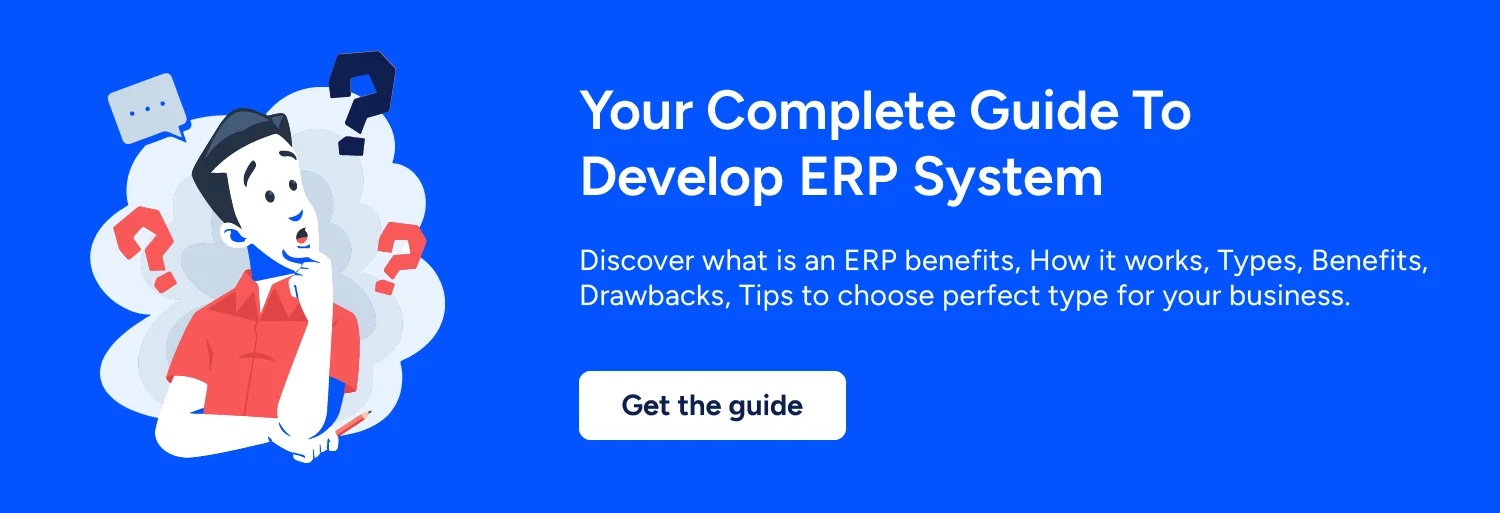
Differences between ERP and CRM
Choosing the right business development tool for your business – ERP or CRM? To answer this question, you need to understand the differences between these two software.
In ERP vs. CRM comparison, ERP systems focus on internal business processes and operations. Unsurprisingly, 70% of large organisations use ERP software to manage their internal operations. They integrate and automate functions such as finance, supply chain, HR, and inventory, with the primary goal of streamlining processes, enhancing efficiency, and reducing costs. ERP systems manage company-wide data and improve operational efficiency and department collaboration.
On the other hand, CRM systems centre on customer interactions and relationships. You might be surprised to know that 82% of organisations use CRM systems for sales reporting and process automation. They handle data related to sales, marketing, and customer service, to boost customer engagement, satisfaction, and loyalty. CRM systems manage customer-related data, simplify implementation, and enhance sales, customer retention, and overall satisfaction.
ERP or CRM: Which is right for your business?
When deciding between ERP and CRM, think about what your business needs. If you want to improve internal processes like finance, inventory, or human resources, go for an ERP system. But if you’re focused on managing customer relationships, sales, and marketing, a CRM system is a better fit. Each system deals with different parts of your business, so it’s important to know your goals.
Over 80% of organisations choose to integrate ERP and CRM systems. This is because they want better insights into their customers and to improve how they work.
By integrating ERP and CRM systems, businesses can connect what happens behind the scenes with what happens when they interact with customers. When both systems work together, you get a complete view of your business—from how customers behave to how well your business is running. And if you start with one system, you can always add the other later as your business grows. This way, your technology grows with your needs.
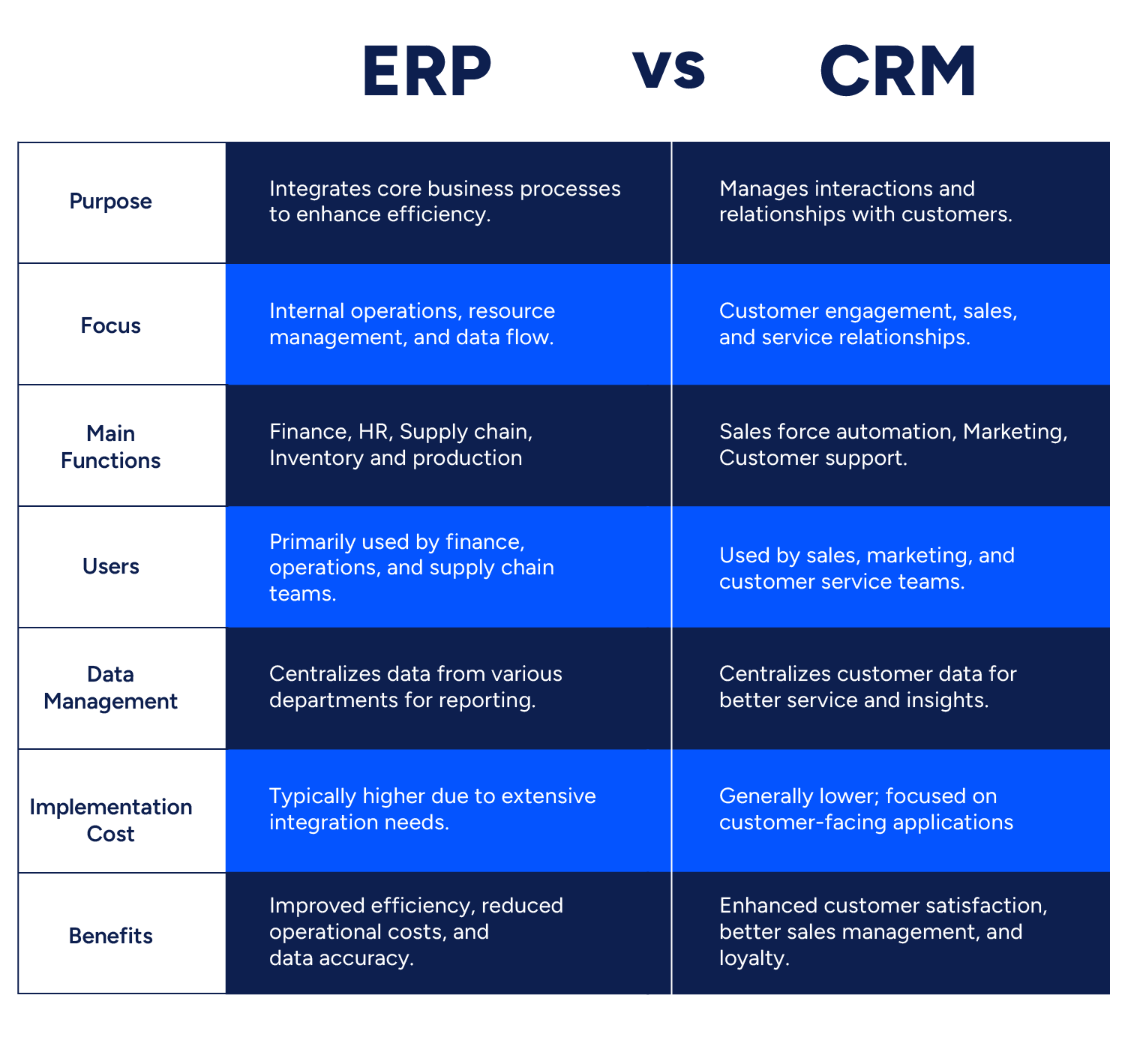
How MeisterIT Systems can help you with custom ERP and CRM solutions?
At MeisterIT Systems, we offer personalised guidance to help businesses choose between ERP and CRM based on their operational needs. Our team assesses your business processes and goals, whether they involve internal operations like finance and inventory, or customer management, sales, and marketing. We specialise in building and integrating ERP and CRM systems to ensure a smooth connection between back-office operations and customer-facing activities. MeisterIT Systems helps you choose the right system and ensures flexibility for future growth.
Conclusion
In today’s competitive business world, ERP and CRM systems each play critical roles. ERP improves internal processes like finance, inventory, and human resources, driving efficiency and cost savings. On the other hand, CRM focuses on managing customer relationships, enhancing interactions, and boosting satisfaction. While ERP and CRM have distinct functions, integrating both systems provides a comprehensive view, enabling smarter, data-driven decision-making and improved overall performance.
Developing software like ERP or CRM can be expensive, but partnering with MeisterIT Systems offers a more cost-effective and streamlined solution. We offer both ERP and CRM software separately and provide integration services for a seamless experience.
Contact us today to know which is better for your business—ERP or CRM!
Frequently Asked Questions
What are the key factors to consider when implementing ERP or CRM systems?
Businesses should consider factors such as budget, scalability, integration with existing tools, and the specific needs of their departments. It is important to involve key stakeholders to ensure the system aligns with operational and customer-facing goals.
How long does it typically take to implement an ERP or CRM system?
The timeline for implementing ERP or CRM varies based on the complexity of the business processes and the system's scope. It can range from a few months for basic setups to a year or more for full-scale, customised solutions.
Are ERP or CRM systems only for large enterprises, or can small businesses benefit too?
Both ERP and CRM systems provide advantages to businesses of all sizes. Small businesses can utilise cloud-based, scalable solutions to streamline operations and enhance customer management without substantial infrastructure investments.
What are the ongoing costs after implementing ERP or CRM systems?
Ongoing expenses consist of software updates, technical support, maintenance, and potential staff training. Cloud-based solutions typically require subscription fees, while on-premise systems may necessitate hardware maintenance.
